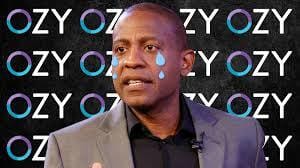- The Cautionary
- Posts
- Greed-to-Grief, No. 9
Greed-to-Grief, No. 9
Fake it till you make it.
The Rise and Fall of Ozy Media: When "Fake It Till You Make It" Goes Spectacularly Wrong
How to Turn $70 Million Into Serious Federal Prison Time in Just 8 Years
Carlos Watson had it all going. Growing up in Miami, he went to Harvard for undergraduate and then to Stanford for his law degree.
He was involved in entrepreneurial ventures, worked at McKinsey & Co. (the world’s top consulting firm), was part of Bill Clinton’s election-day team in south Florida, and worked his way onto the board of National Public Radio while being a daytime anchor on MSNBC.
It wasn’t enough.
The Rise (2013-2021): Peak Delusion Era
Back in 2013, when everyone was still pretending digital media were the future and not a financial black hole, Watson founded Ozy Media with the idea of making content targeted for the millennial audience.
One of the biggest misconceptions in business is the cost to produce content. Content includes audio, video, magazines, etc. Every year, we get the number for the cost of purchasing a 30-second ad for the SuperBowl. Last year, it was about $7.0 million.
But that is just the cost of buying the air time during the game. What about the costs of creating such an ad? Estimates are in the range of an additional $20 million to pay celebrities, rent the locations, and produce the ad.
Imagine the costs of constantly producing new content like Ozy purported to do? That $70 million it raised was only basic start-up money. When Steve Spielberg, Jeffrey Katzenberg, and David Geffen founded the DreamWorks studio to produce movies, they had more than $1.0 billion on hand on day one.

Carlos Watson
Ozy managed to ride the investment wave alongside fellow media companies like BuzzFeed and Vice, attracting venture capital from people who apparently never asked questions like "How do you actually make money?" or "Are your audience numbers real?"
For eight blissful years, Watson played media mogul while inventing phony financial figures and causing others to forge fake contracts.
It was like playing SimCity with other people's money, except instead of building a virtual metropolis, they were building a house of cards made entirely of lies and investor gullibility.
The Fall (2021): The Goldman Sachs Call That Launched a Thousand Lawsuits
The beginning of the end came with what might be one of the most brazen examples of corporate fraud in recent memory. Picture this: you're trying to impress Goldman Sachs bankers to get more money. Normal people might, I don't know, show actual business metrics or maybe a realistic business plan.
Not Ozy. Watson coached his co-founder Samir Rao to impersonate a YouTube executive on a call with Goldman Sachs, because apparently they thought investment professionals from Goldman Sachs were easy to fool.
During this Oscar-worthy performance, fake YouTube executive Rao claimed YouTube had agreed to pay for exclusive rights to an Ozy show. The audacity is almost admirable – like watching someone try to pay for a Ferrari with Monopoly money while maintaining complete eye contact.
Impersonation is a felony. Felonies include other crimes like murder. The general rule is that a felony conviction comes with federal prison time. There is no leeway for first-time offenders or special circumstances. Felonies are serious crimes.
The Collapse: When Reality Comes Knocking
In September 2021, The New York Times investigated and revealed that in addition to the legendary YouTube executive impersonation, Ozy had falsified audience metrics.
The fake audience metrics intentionally deceived advertisers into paying Ozy more than it was owed. Ozy may have reported 100,000 views of a sponsor’s ad, when in fact there were only 1,000 views. (Intentional deception is one of the key elements of fraud.)
What followed was a spectacular six-day collapse with Watson unable to face reality and insisting each day he wouldn't shut down the company — as if he was still a decision maker.
The Aftermath: Federal Prison
In July 2024, Watson and Ozy Media were convicted of fraud at trial, because federal prosecutors were less impressed by elaborate YouTube impersonation schemes than venture capitalists.

The inside of a federal prison
Watson was sentenced to almost 10 years in federal prison, while also being hit with a $96 million restitution and forfeiture order. I guess he can put those fancy degrees to work teaching math and english to fellow inmates.
Key Takeaways
Ozy's rise and fall perfectly tracked the broader internet media bubble of the 2010s, serving as a case study in what happens when Silicon Valley's "fake it till you make it" mentality meets actual federal wire fraud statutes. (We previously discussed wire fraud here.)
Watson went from scoring tens of millions in funding to federal prison in just eight years, which might actually be a new speed record for media startup self-destruction.
In the end, Watson's grand vision of building a media empire resulted in the most expensive lesson in "don't commit federal crimes" in recent memory.
Things I think about
About 70% of all volcanic activity occurs under the Earth’s oceans.
Recommended reading
Fortune’s Formula
The story of the Kelly Formula, still in use today at casinos and Wall Street.
The Billionaire’s Apprentice
Insider trading and the downfall of Raj Gupta, former chair of McKinsey & Co.
The Seven Deadly Stupidities
Learn from the failures of others. Written by….. me.
The Generative AI Con
My favorite tech contrarian, Ed Zitron, goes off, big time.
Fooled by Randomness
The first in Caleb’s series and the “Black Swan” book. All his books are excellent.
See the full reading list here.